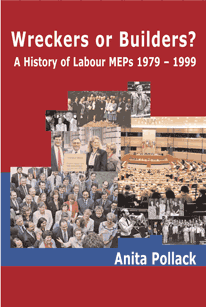
Anita Pollack

"Wreckers or Builders?"
Review by Glyn Ford
Ford, Glyn (2009) 'Confusing party members, snatching defeat from the jaws of victory and other stories from twenty years of the European Parliament' Tribune. 11 December 2009, p25
The Little Englander tendency – ably abetted by the Scots and the Welsh – hounded the pragmatists with their version of the 12 articles of the Independent Labour Party demanded of the Third International In 1920 requesting their adherence to the principle of withdrawal. It began to resemble the nursery rhyme, “Bigger fleas have little fleas upon their backs to bite ’em, while little fleas have lesser fleas, and so on ad infinitum” with Campaign and Tribune groups meeting before the Broad Left that met before the EPLP. Thus, by 1987, the right and Tribune left combined to put the EPLP back on its feet, only to be undone 12 months later as one member, now in the Tory Party, demonstrated his flexible principles by reversing his vote for the second year running and one former MP ignored a direct appeal from Neil Kinnock.
In 1989 the situation was reversed yet again as new MEPs, further departures to Westminster and the de-selection of Les Huckfield shifted the balance once more. This gave four years of stability as the EPLP stopped looking inward and began to become a force within the Socialist group. Even prior to this individual MEPs, such as Gordon Adam on energy, Ken Collins on the environment and Michael McGowan on development had shone as individuals, but now the EPLP as a whole, led by Carole Tongue, Alan Donnelly and Ken Coates, began to make an impact. All too much of a betrayal for the Campaign group who finally colluded with the old right to oust the Tribunites. As one said, justifying his vote: “The danger is that showing Europe can be used by the left may confuse party members.”
It could get personal. On a visit to Sweden a note was left on a public notice board for one gay MEP that his “Aids test result was ready”. On the other side, one visiting senior MP recited a much quoted poem he entitled: “The decline and fall of the Labour movement in south east Wales, 1929 to 1984” that started, “Aneurin Bevan, Michael Foot…”
Labour’s 1992 defeat only boosted the number of MEPs elected two years later to 62 – and that gave the EPLP on its own three of the Parliament’s 20 committee chairs and had Pauline Green leading the Socialist group unchallenged for five years. Not that there was not trouble from time to time. Tony Blair’s promise to remove Clause 4 of the Labour Party constitution led to an infamous advert on the front page of The Guardian signed by 32, a majority, entitled “Labour MEPs Defend Clause 4”. The ad appeared on the morning of Blair’s first visit to Brussels as Labour leader, completely overshadowing any positive press coverage it might have engendered. Some claimed not to have known what they were signing. Thirty-six signed a letter to The Guardian the following day backing the leader. Seven penitents signed both. One, Christine Oddy, even changed her mind for a second time and wrote disavowing her signature on the initial letter to The Guardian. Some claimed it was this that triggered the introduction of PR for the 1999 Euro elections. It wasn’t. It was the EPLP AGM decision of 1997 when an attempt to bring the EPLP standing orders into line with the PLP and include a section stating that members would “do nothing that brings the party into disrepute” was rejected.
The new Labour Prime Minister had had enough; PR it was to be. This decision had two consequences. First, in 1999 the imposition of PR saved Labour seats – well, New Labour seats. (It also enabled the beginning of the purge of pro-European Tory MEPs). A straight read through of the results would have given Labour only about 17 MEPs on the basis of first past the post, but they would have included a number of Campaign group members. As it was the 29 included only six of the 32 that signed The Guardian ad and three of these were penitenti, while 21 of the 36 letter writers returned, five went to the House of Lords and two became MPs. Nothing in the period 1994-99 better correlated with who was to be re-elected than who signed what in January 1995.
Second, it helped to fracture British politics. Despite strong urging to apportion seats in 3 to 5 seat regions the party decision was to stick with traditional regions that varied from 3 to 11 seats. Without this blatantly absurd choice, no new party would have broken through into the European Parliament, not UKIP in 1999, not the Greens in 2004, and not the neo-Nazi BNP in 2009. This has proved extremely costly for Labour. One could argue that it did more to put Nick Griffin on Question Time than the BBC.
Anita Pollack has served the EPLP well. She promises a further volume to bring it all up to date. To be constructively critical, maybe next time there should be less cosmetic surgery and a stronger story line – warts and all and some bad guys and gals. One MEP rewriting history is fine, but not four score!
Glyn Ford who bears some responsibility for all of the above